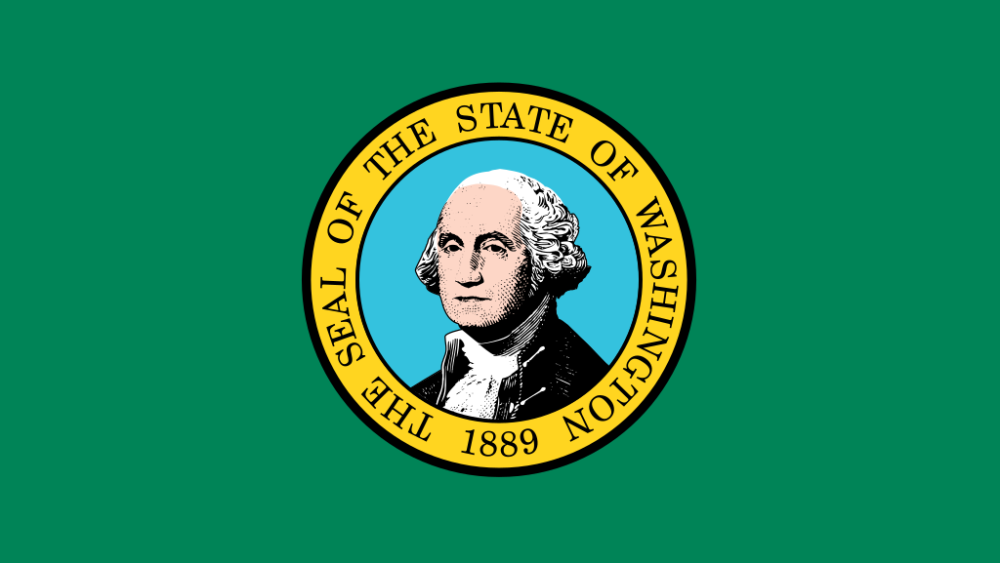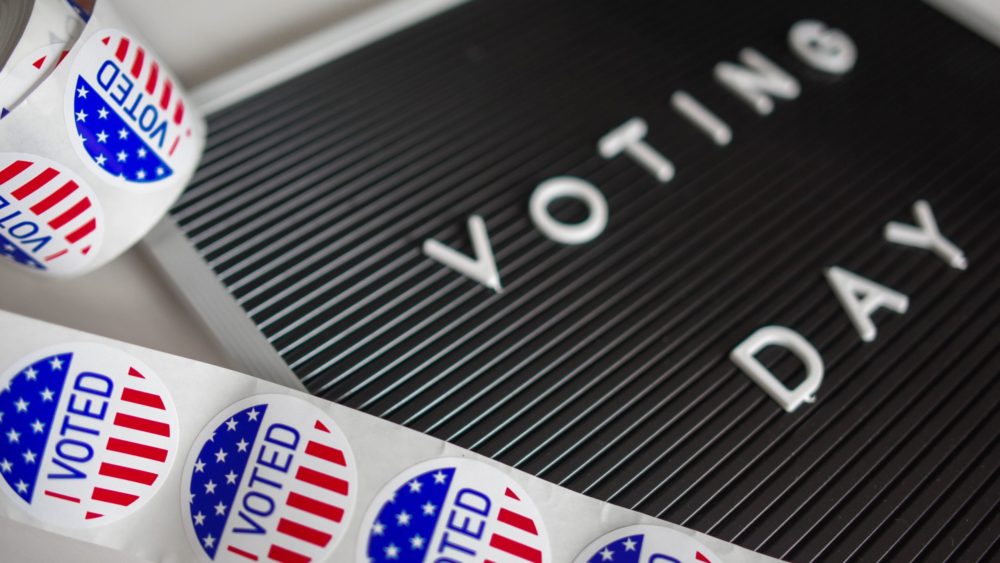November 6, 2024 •
Washington Democrats Win Bid For Governor

Flag of Washington
Washington Attorney General Bob Ferguson won his bid for Governor against his Republican U.S. Rep. Dave Reichert. Reichert had always faced an uphill battle as it has been 40 years since the state last had a Republican governor. The final […]
Washington Attorney General Bob Ferguson won his bid for Governor against his Republican U.S. Rep. Dave Reichert.
Reichert had always faced an uphill battle as it has been 40 years since the state last had a Republican governor.
The final tally of votes saw Ferguson winning with 56% of the vote.
March 8, 2024 •
Washington Legislature Adjourns Sine Die
The Legislature quietly adjourned sine die on March 7 after passing a procurement and campaign finance bill. House Bill 1471 modifies the state procurement procedures and revises definitions concerning competitive, sole source, convenience, and emergency goods and services contracts. Senate […]
The Legislature quietly adjourned sine die on March 7 after passing a procurement and campaign finance bill.
House Bill 1471 modifies the state procurement procedures and revises definitions concerning competitive, sole source, convenience, and emergency goods and services contracts.
Senate Bill 5857 reorganizes the campaign disclosure and contributions statutes through technical amendments involving campaign disclosure and contributions at the state and local levels.
These bills will now be sent to the governor for his signature.
December 18, 2023 •
Washington Updates Lobbying Reporting Thresholds
The Public Disclosure Commission recently voted to adjust the lobbying reporting thresholds due to inflation. This was decided after a public hearing was held and is a continuation of a broader effort to update the thresholds through the state’s political […]
The Public Disclosure Commission recently voted to adjust the lobbying reporting thresholds due to inflation.
This was decided after a public hearing was held and is a continuation of a broader effort to update the thresholds through the state’s political disclosure rules.
Updates include an increased threshold for itemizing expenditures on entertainment and food or beverage for public officials from $50 to $100.
Another update raises the limit for lobbyist and lobbyist employer reporting of a last-minute contribution from $1,000 to $1,500.
The thresholds will be in effect for the January reporting period due in February.
The December reporting period due in January will fall under previous thresholds. The new reporting thresholds take effect on January 8, 2024.
August 7, 2023 •
Ask The Experts – Registration Threshold in Washington
Q: I’ve had a few discussions with legislators in Washington. Do I need to register? A: Unlike some states that require registration before you begin lobbying, Washington is not a “first toe in the water state.” As a result, there […]
Q: I’ve had a few discussions with legislators in Washington. Do I need to register?
A: Unlike some states that require registration before you begin lobbying, Washington is not a “first toe in the water state.” As a result, there are some activities that you can engage in before or without the need to register as a lobbyist.
Washington requires you to register as a lobbyist once you have either conducted lobbying activities for more than four days, or parts of four days, in a three-month period, or made total expenditures exceeding $35 in a three-month period for or on behalf of public officials. So, if your lobbying activity is extremely sporadic and limited, you may not need to register.
But Washington also has a relatively narrow definition of what constitutes lobbying. Lobbying is defined as an attempt to influence the passage or defeat of any legislation or the adoption or rejection of any rule, standard, rate, or other legislative enactment of any state agency. This definition excludes acts of goodwill lobbying, like small-talk with lawmakers or general relationship-building with public officials. But, be mindful of your activities, because if your small-talk conversation turns to shoptalk about a specific issue or piece of legislation, then that conversation will put you closer to crossing the lobbying registration threshold.
Similarly, the state’s lobbying law carves out several activities that it does not consider lobbying. If you limit your activities to appearing before public sessions of committees of the legislature or public hearings of state agencies, then you will not need to register. Similarly, activities by persons whose participation was solicited by an agency under a negotiated rulemaking or pilot rulemaking agency will not, by themselves, require you to register as a lobbyist.
More information about registration requirements can easily be found on our website in the Registration section of the Lobbying Compliance Guidebook.
May 17, 2023 •
Washington’s Short Special Session Ends
The Washington Legislature adjourned a one-day special session after passing a new drug possession law. The new bill makes it a gross misdemeanor to use drugs in public or possess small amounts of drugs and adds alternative sentencing for minor […]
The Washington Legislature adjourned a one-day special session after passing a new drug possession law. The new bill makes it a gross misdemeanor to use drugs in public or possess small amounts of drugs and adds alternative sentencing for minor drug offenses. The original bill failed on the last day of the regular session, with both progressive Democrats and Republicans voting down the bill. The new law is a compromise between the parties, with both sides getting inclusions into the law.
Gov. Jay Inslee signed House Bill 1317 and Senate Bill 5152, updating campaign and lobbying rules in response to current technologies and practices involving online activity and social media. House Bill 1317 was designed to shed light on special interest […]
Gov. Jay Inslee signed House Bill 1317 and Senate Bill 5152, updating campaign and lobbying rules in response to current technologies and practices involving online activity and social media. House Bill 1317 was designed to shed light on special interest “astroturfing” in grassroots lobbying. The new law expedites registration of sponsors of grassroots lobbying campaigns and increases the disclosures that must be made in the registration and any advertisements made by the lobbying campaign.
Senate Bill 5152 seeks to combat the advent of “synthetic media” political ads. These ads are created when, via artificial intelligence or other such programs, media is manipulated to cause a person (in this case a politician) to say or act in a way that did not happen. Senate Bill 5152 gives a target of synthetic media a course of action to force a sponsor or media platform to terminate the synthetic media campaign. The bill also gives the sponsor the ability to add a disclosure to the synthetic ad stating the ad or image is a synthetic media post. Both bills become effective July 23.
April 27, 2023 •
Washington Legislature Adjourns Sin Die
The Washington Legislature adjourned sin die on April 23. Lawmakers passed over 450 bills during the session, including a $69 billion dollar budget bill that raises pay for state employees and public-school teachers. Additionally, Senate Bill 5170 was signed into […]
The Washington Legislature adjourned sin die on April 23.
Lawmakers passed over 450 bills during the session, including a $69 billion dollar budget bill that raises pay for state employees and public-school teachers.
Additionally, Senate Bill 5170 was signed into law, allowing the solicitation of gifts, grants, or donations to support conferences of national or regional legislative organizations held outside the state by certain legislators and staff.
The Public Disclosure Commission certified increases in reporting and contribution limits in response to inflation. The inflationary adjustments touch almost every threshold and limit. Contribution limits increase from $1,000 to $1,200 for state and county legislative candidates and from $2,000 […]
The Public Disclosure Commission certified increases in reporting and contribution limits in response to inflation.
The inflationary adjustments touch almost every threshold and limit.
Contribution limits increase from $1,000 to $1,200 for state and county legislative candidates and from $2,000 to $2,400 for other state offices.
Limits for political parties increase from $5,500 to $6,000.
November 9, 2022 •
King County, Washington Elections moved to Even-Numbered Years

King County, Washington voters have approved Charter Amendment 1. The amendment moves elections for county executive, county assessor, county director of elections, and county council members to even-numbered years. For each position currently in an odd-year term, the current term […]
King County, Washington voters have approved Charter Amendment 1.
The amendment moves elections for county executive, county assessor, county director of elections, and county council members to even-numbered years.
For each position currently in an odd-year term, the current term is changed to a three year term to move to an even-numbered schedule.
September 28, 2022 •
Spokane Overhauls City’s Campaign Finance Laws

Flag of Washington
The Spokane City Council voted Monday to raise the individual donor limit to $1,000 and to clear redundancies in the city’s Fair Elections Code. The council decided, due to advances in Washington’s campaign finance statutes, that the city’s current campaign […]
The Spokane City Council voted Monday to raise the individual donor limit to $1,000 and to clear redundancies in the city’s Fair Elections Code.
The council decided, due to advances in Washington’s campaign finance statutes, that the city’s current campaign finance laws created uncertainty and were redundant.
The council moved to incorporate the State’s definitions and current individual donor limit.
The new limit will take effect October 26, 2022.
July 20, 2022 •
King County Sends Elections Amendment to the Voters

Flag of Washington
King County, WA has approved an amendment to the King County Charter to be sent to the voters during the November 8 election. The amendment moves elections for county executive, county assessor, county director of elections, and county councilmembers from […]
King County, WA has approved an amendment to the King County Charter to be sent to the voters during the November 8 election.
The amendment moves elections for county executive, county assessor, county director of elections, and county councilmembers from odd-number years to even-numbered years starting in 2026.
There will be an election held in 2023 for the county assessor, county director, and even-numbered district councilmembers.
The county executive and odd-numbered district councilmembers will be elected in 2025 before moving to even-numbered year elections in 2026.
July 6, 2022 •
Washington PDC Raises Late-Contribution Threshold
The Washington Public Disclosure Commission (PDC) has raised the threshold for reporting last-minute contributions from $1,000 to $1,500. Contributions of or exceeding $1,500 that occur within seven days of a primary election and 21 days before a general election must […]
The Washington Public Disclosure Commission (PDC) has raised the threshold for reporting last-minute contributions from $1,000 to $1,500.
Contributions of or exceeding $1,500 that occur within seven days of a primary election and 21 days before a general election must be reported separately by both the contributors and the campaigns who receive them.
Once the threshold is reached, contributors must file with the PDC a last-minute contribution report within 24 hours of reaching the threshold, while recipients have 48 hours to report the contribution.
April 11, 2022 •
Seattle Ethics Commission Votes to Raise Limits

Seattle, WA - by Daniel Schwen
The Seattle Ethics and Elections Commission has raised the limit for contributions given to a candidate for mayor, City Council, or city attorney to $600 per election cycle. This limit only applies to candidates who are not participating in the […]
The Seattle Ethics and Elections Commission has raised the limit for contributions given to a candidate for mayor, City Council, or city attorney to $600 per election cycle.
This limit only applies to candidates who are not participating in the Democracy Voucher Program.
Contribution limits are adjusted before each election cycle to account for inflation or deflation using the consumer price index.
March 11, 2022 •
Washington Legislature Adjourns Sine Die
The Washington Legislature adjourned sine die March 10 after passing a $64.1 billion state budget and a nearly $17 billion transportation package. During the session, both houses passed Senate Bill 5196 and Senate Bill 5855. Senate Bill 5196 allows the […]
The Washington Legislature adjourned sine die March 10 after passing a $64.1 billion state budget and a nearly $17 billion transportation package.
During the session, both houses passed Senate Bill 5196 and Senate Bill 5855.
Senate Bill 5196 allows the Legislature to call a special session through an affirmative vote of at least two-thirds of both chambers.
Senate Bill 5855 allows the use of campaign funds to reimburse a candidate for expenses incurred for childcare, care for a person with a disability, or the care for a person with a medical condition that occurred directly because of the candidate’s campaign activities.
Both bills have been sent to Gov. Jay Inslee and await his signature.
State and Federal Communications, Inc. provides research and consulting services for government relations professionals on lobbying laws, procurement lobbying laws, political contribution laws in the United States and Canada. Learn more by visiting stateandfed.com.


